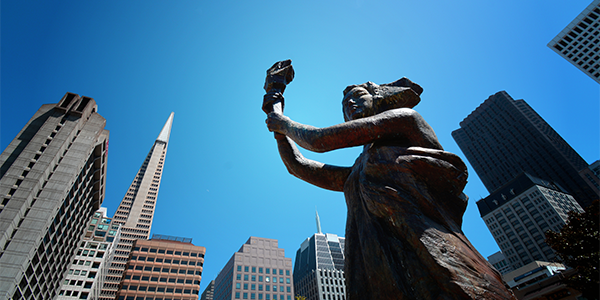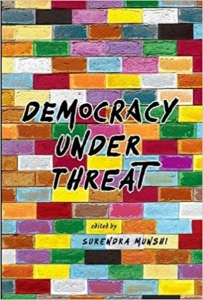Book Review | Democracy Under Threat edited by Surendra Munshi
In Democracy Under Threat, editor Surendra Munshi brings together twenty contributors to explore the challenges facing democracy globally. While the collection largely avoids examining the role of capitalism in undermining democracy, this is a well-edited, stimulating and distinctive book that is highly recommended by Luke Martell.
 Picture: ‘Goddess of Democracy’ statue, San Francisco (Eric Sonstroem CC BY 2.0)
Picture: ‘Goddess of Democracy’ statue, San Francisco (Eric Sonstroem CC BY 2.0)
Democracy Under Threat. Surendra Munshi (ed.). Oxford University Press. 2017.
 Democracy Under Threat emerges from a widespread concern that democracy, until recently spreading globally, is in danger from converging challenges. The collection, edited by Kolkata sociologist Surendra Munshi, comes out of a 2016 conference of the Forum 2000 Foundation, which aims to continue the legacy of former Czech President, the late Vaclav Havel, by supporting values of democracy and human rights. A distinctive dimension is that the twenty contributors come from fourteen countries, several beyond the ‘West’, and much of the content is rooted in the specific experiences of the localities where the authors are based. Some are academics, but many are political leaders and from public service. The diversity of inputs brings out a breadth of dimensions and threats and the book has been brought together well, particularity being preserved alongside common themes and coherence. It is also up-to-date: for instance, several chapters include discussion of the Trump and Brexit era. Contributions are short, readable and flow, whilst also being substantial and telling.
Democracy Under Threat emerges from a widespread concern that democracy, until recently spreading globally, is in danger from converging challenges. The collection, edited by Kolkata sociologist Surendra Munshi, comes out of a 2016 conference of the Forum 2000 Foundation, which aims to continue the legacy of former Czech President, the late Vaclav Havel, by supporting values of democracy and human rights. A distinctive dimension is that the twenty contributors come from fourteen countries, several beyond the ‘West’, and much of the content is rooted in the specific experiences of the localities where the authors are based. Some are academics, but many are political leaders and from public service. The diversity of inputs brings out a breadth of dimensions and threats and the book has been brought together well, particularity being preserved alongside common themes and coherence. It is also up-to-date: for instance, several chapters include discussion of the Trump and Brexit era. Contributions are short, readable and flow, whilst also being substantial and telling.
The volume is introduced clearly and substantively by Munshi and has sections that cover crises in democratic leadership; fragility in democratic institutions; growing authoritarianism internationally; populism and dynastic rule; and the failure of the West. Two final, eloquent, intriguing and more philosophical chapters by Ramin Jahanbegloo and Munshi focus on ‘post-truth’, linking Gandhi and Havel. Disregard of truth by the powerful isn’t new, but these contributions made me want to pick up books by these authors that I last looked at decades ago. From a position in the West, where dynastic politics, as Paul Flather points out, are also not exactly absent, the chapters on dynasty in India and elsewhere (another is by Neelam Deo and Arjun Chawla) are fascinating.
The book charts a numerical reduction in states that are democratic, and declining democracy in those that still are. It discusses authoritarian leaders in countries such as Russia, China, Turkey and the Philippines, some democratic in the past, some attacking democracy within but also beyond their borders. It notes support in these states for strong leaders over western democracy. Russia’s interventions abroad have been very publicly discussed. This book covers this (Adam Michnik, especially, focuses on Putin) and does well to also detail China’s role internationally (for example, in Christopher Walker’s chapter). It explores rising populism globally as anti-democratic.
Contributing authors argue that the causes behind these shifts include the declining efficacy of democratic states, leading to scepticism about democracy itself, recent examples being the financial crisis and austerity policies. Outcomes in some of the Arab Spring countries are said to have damaged hope for democracy. Chapters outline how the internal and overseas dimensions of US politics are undemocratic or concern self-interest over democracy, and it is argued that globalisation has undermined the capacity of democratic states to the benefit of powerful unelected actors like international organisations and corporations.
Contributors such as Shlomo Avineri and Iveta Radičová argue that a disconnect between politicians and elites on the one hand, and people on the other, has led to greater populism, which can be a threat to democracy. The book captures a move from optimism about new social media to concerns about the way it can lead to communication bubbles and be used against democracy. Some authors claim that alleged mass migration has also been a factor afflicting faith in democracy.
While the volume has a welcome diversity of inputs, there are, as the editor states, omissions. Africa, as often, is very under-represented in terms of authors and discussion. Elites have more of a say than the grassroots, and in some chapters you get the feeling that educated elites are more trusted than the popular masses – not a very democratic sentiment. While many contributors are from beyond the West, there is overwhelming support for western liberal democracy which goes sometimes (but not always) unquestioned.
But while liberal rights and competitive elections are hugely important, liberal democracy limits state intervention in the market. The power of corporations and the wealthy can, consequently, go untackled. The book focuses more on the undemocratic role of money in political institutions than outside them. While the financial crisis is highlighted often, capitalism and neoliberalism are either rarely mentioned or not often critically, their problems seen as the result of them going wrong or being pursued to excess, rather than structural. Without equality and the democratisation of the economy, democracy is limited, something the book could engage with more. Pursuing equality involves limiting some freedoms (for instance, of property accumulation) as is argued by Alexandr Vondra. But freedom and democracy can be underpinned by economic equality. Policies that restore faith in democracy require facing up to corporate power, and the populism that is condemned comes in different forms – some is about tackling the power of big business. Populism can be economically egalitarian, about the devolution of power to people and popular control through social ownership rather than about authoritarian leaders. Oscar Arias claims that the educated young reject populism, especially in the USA and UK. In fact, the left populism of leaders like Bernie Sanders in the USA and Jeremy Corbyn in the UK has particularly strong support from the educated and young.
Globalisation in the form of global trade deals puts power in the hands of corporations, inscribing deregulation in agreements, so taking it away from democratic control. But some of the book’s authors (Arias, for example, but certainly not all: see Suat Kiniklioğlu’s chapter) see economic globalisation benignly as part of western liberal democracy, and while democratic global regulation is discussed, it is not so widely. Contributions such as Tarek Osman’s and Axel Kaiser’s dismiss arguments that blame the West for problems in Arab or Latin American countries and state that those places have to take responsibility for themselves. But this is at odds with contributions (sometimes the same ones) that remark on the globalised nature of the world (in some cases, neoliberal global capitalism is seen as inevitable) and on powerful states, often liberal democratic ones, undermining democracy overseas. There are good points made about the use of information technology against democracy, but social media has also enabled horizontal organisation, fact-checking and resistance to the propaganda and lies discussed through the book – part of democratisation as well as a threat to it.
A number of contributions condemn xenophobia and nationalism, and politicians who whip it up: Andrej Kiska’s, for instance (although he still sees those politicians as meaning well). But contributors such as Avineri and Carl Gershman blame purported mass immigration for this, and so run the risk of contributing to xenophobia. Sometimes elites foster the anti-immigration populism they condemn. In fact, there are very tight controls on immigration into rich countries. It is not the case, as Vondra claims, with inflammatory language, that migration into Europe involves ‘uncontrolled flows’, or quite right to say, as Walker does, that millions are fleeing wars and hardship for Europe. In fact, as bodies like the United Nations Refugee Agency (UNHCR) show, the proportion who do is quite small and many cross nearby borders to poorer countries, which are more open despite scarcer resources. Immigration to Europe and North America brings economic growth and cultural diversity. Such contributors would do better to frame migration positively rather than attribute xenophobia to immigration, as migrants often have very just cause to move, and if they are lucky enough to find a home elsewhere, can make a positive contribution there.
This is a fascinating and diverse book, rich in its coverage. It doesn’t aim to examine the limits of liberalism and the role of capitalism in undermining democracy, but more on these would illuminate discussions on what afflicts democracy. Socialism sorely needs liberalism, as is touched on, but liberalism can benefit also from socialist insights. However, on liberal democracy and the upsurge in the challenges it faces internationally, this is a well-edited, stimulating, distinctive book that raises major current issues in global societies and politics. It’s also a good read. I recommend it highly.
This review gives the views of the author, and not the position of Democratic Audit. It was first published on the LSE Review of Books blog.
Luke Martell is a Teaching Fellow in Sociology at the University of Sussex. He has written about socialism, social alternatives, global politics and social movements. Read more by Luke Martell.





 Democratic Audit's core funding is provided by the Joseph Rowntree Charitable Trust. Additional funding is provided by the London School of Economics.
Democratic Audit's core funding is provided by the Joseph Rowntree Charitable Trust. Additional funding is provided by the London School of Economics.